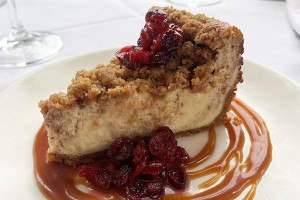Four Reasons to Say ‘Prost!’ at Bronwyn in Somerville
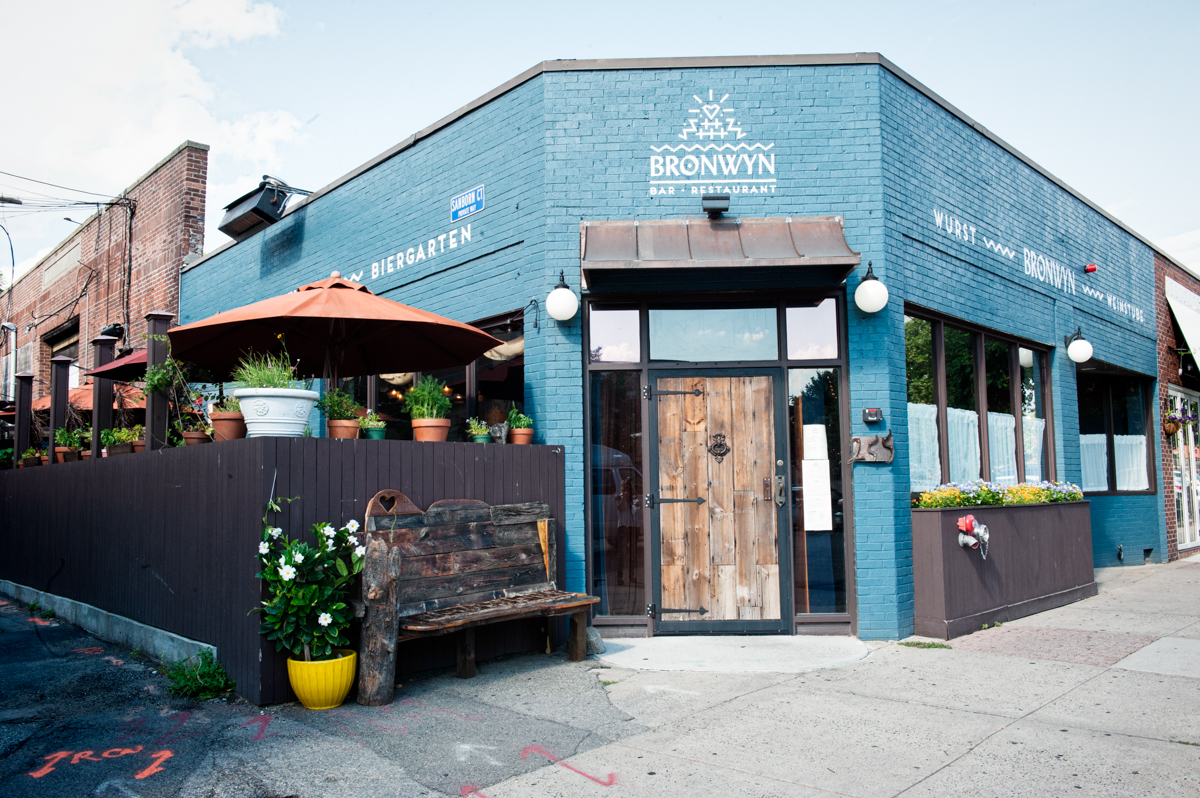
Photo by Chelsea Kyle
If it were possible for a restaurant to have an evil twin, T.W. Food’s brooding dopplegänger would almost assuredly be Tim Wiechmann’s other culinary concept, Bronwyn in Union Square. Whereas T.W. Food has white tablecloths, a glowing interior, and fresh cut flowers craning their necks toward the sunny, panoramic front windows, Bronwyn is cluttered with iron chandeliers, dried willow wreaths, and dark, angular furniture that casts the room in shadow. Yet, despite their contradictory interiors and disparate views on gastronomic excess, both restaurants somehow embody Wiechmann’s meandering path to the kitchen.
“We define our palates as children and I spent my childhood in a number of different places: New England, South America, the Southwest, and Austria,” Wiechmann says. “I’m a mashup of a number of different influences. I’m a German-American chef that was raised in both Europe and America. I’m a classically French trained chef with a family history in Germany and Eastern Europe. With Bronwyn I wanted to unshackle myself from the technical proficiencies and French cuisine I spent so many years honing. I also wanted to explore my past culture, and a part of the world I’m very passionate about.”
After training at Le Cordon Bleu in Paris and toiling under the likes of Joel Robuchon at Atelier, Wiechmann turned to a very different type of cuisine. Gone were the farm-to-table prix fixe menus. Foie gras and caviar accents were replaced by towering plates of schnitzel. Piemonte reds and champagne buckets were usurped by Underberg shots and liter drafts of lager. But by no means was Wiechmann’s work blasé beirgarten fare.
“I define this as the new cuisine of Germany and Europe,” Wiechmann says. “For me that means making kolaches but putting avocado salad underneath. Or making wurst and injecting it with curry. It’s about America’s synthesis of crisscrossed cultures. A lot of Europeans come in and say, ‘this isn’t like a traditional German restaurant.’ And they’re right! But I’ve also had Germans come in and say ‘this is by far the best German food I’ve ever had.’”
Here, four ways that Wiechmann is making German cuisine all his own.
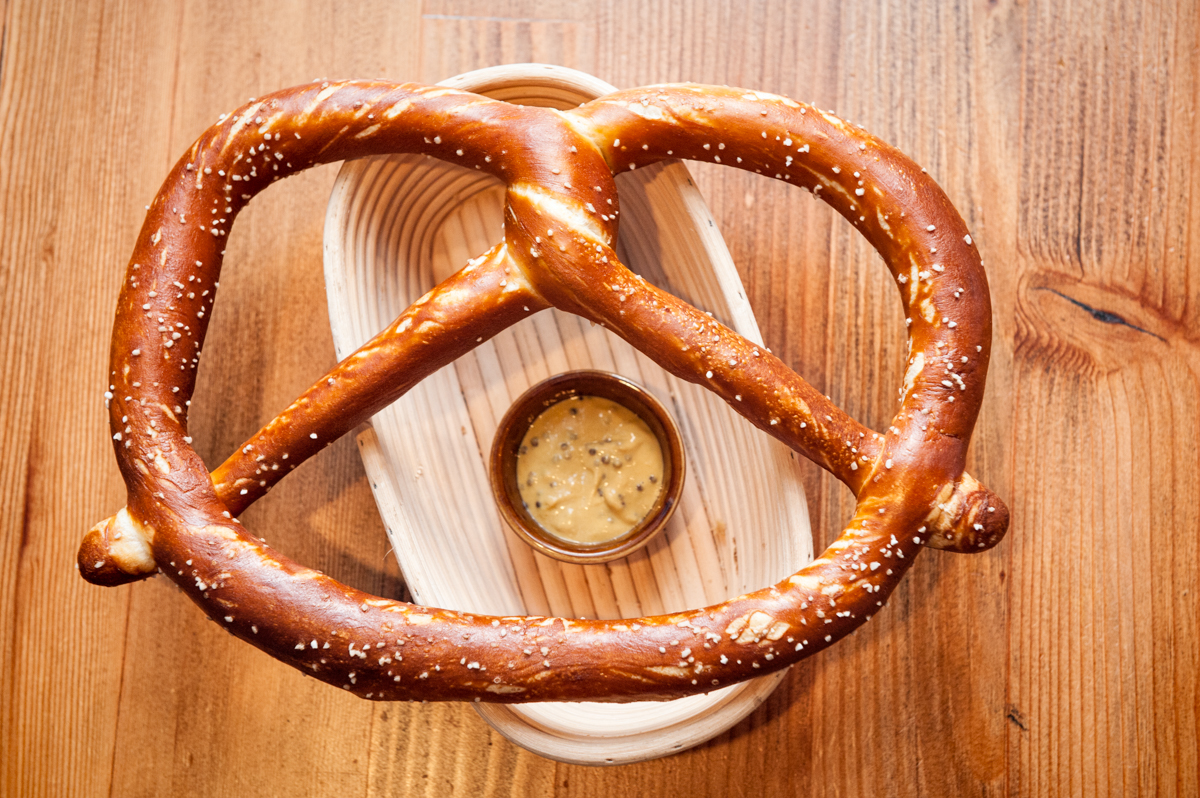
Bronwyn’s Giant Haus Pretzel. Photo by Chelsea Kyle
1. Giant Haus Bretzel
“The pretzel is the one thing on the menu I tried to make as traditional as possible,” Wiechmann says. “The only thing that’s different about it is that it’s pretty big. You really only see these type of giant pretzels at Octoberfest in Bavaria. You don’t see pretzels like these in Zurich or Salzburg.”
Twisted and maneuvered from an unwieldy five-foot piece of dough, Wiechmann admits that Bronwyn’s 16-inch pretzels were one of the most difficult dishes he undertook when he delved into his grandmother’s repertoire. Served hot from the oven, with a chewy crumb and a salty, crackly exterior, Bronwyn’s pretzels are practically mandatory snacking, despite enticing alternatives like fried bologna and pork-infused schmaltz. “There’s no honey in it or anything weird,” Wiechmann says. “Our little twist is a spicy Dijon dipping sauce with pickled mustard seeds and horseradish. But overall, I was just trying to make a really good pretzel.”
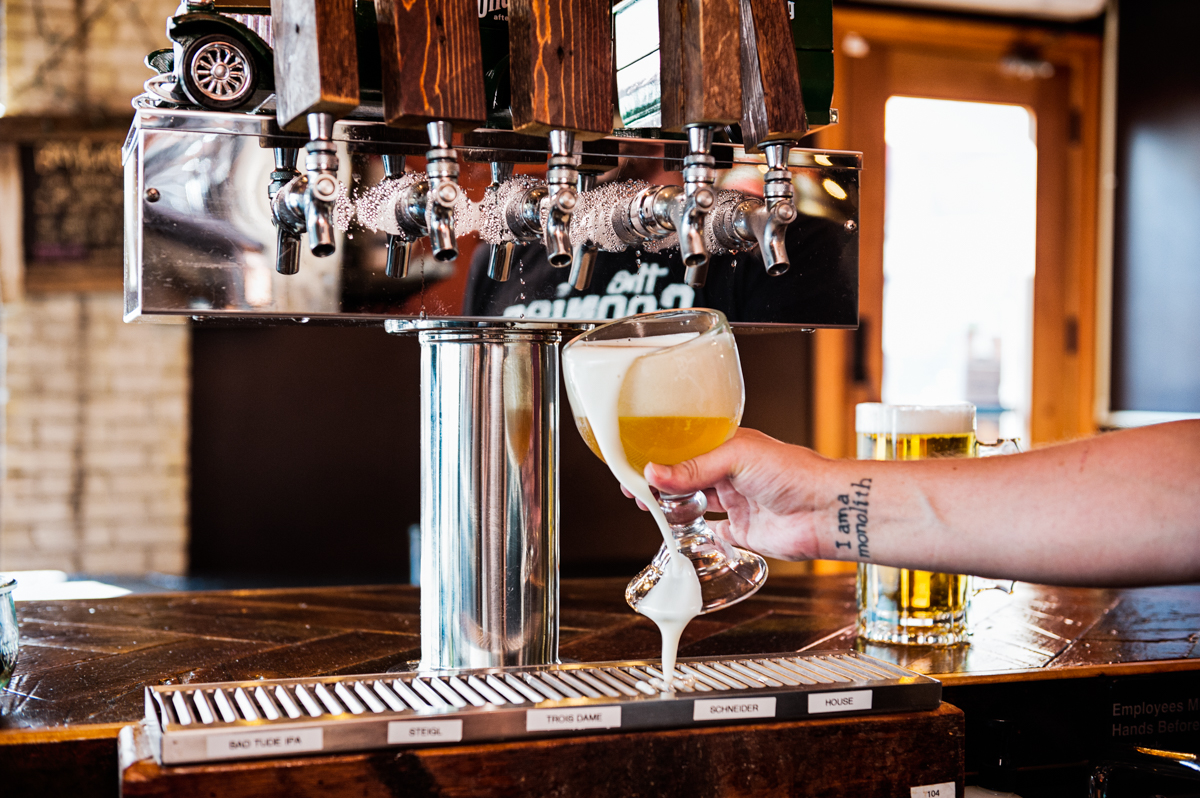
Photo by Chelsea Kyle
2. Lots and Lots of German Beer
Lord Hobo and The Publick House might have cornered the market on American craft beer in Boston, but nobody can touch Bronwyn’s breadth of options from across the pond. From ebony-hued schwarzbiers and banana-tinged dunkels to all manner of hefeweizens (grapefruit, organic) and mouth-puckering Berliner Weisses, beers from Eastern Europe dominate a large swath of Bronwyn’s book-length beer list.
“We definitely pride ourselves on our beer list,” Wiechmann says. “When we opened, we set a little beer constitution for ourselves. We’ll never have Belgian beer here. Period. It’s not a putdown of Belgium; it’s just where we’re drawing our line. We have some American craft brews, but only the ones with German origins. It’s just one significant way we can showcase our identity. We don’t want to water down what we’re trying to say.”
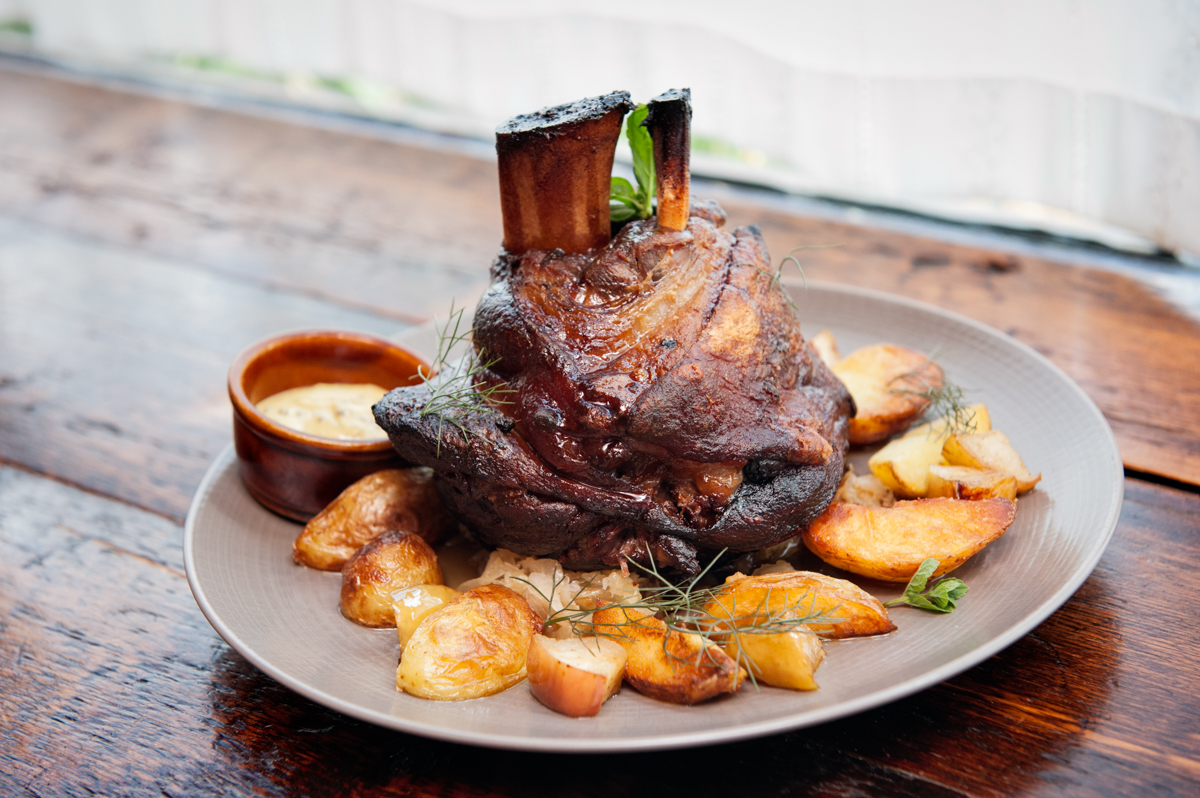
A two-pound, beer-braised Haxe with potatoes and sauerkraut. Photo by Chelsea Kyle
3. Two-Pound Haxe
Weihenstephaner lager is more than just the house beer— served in one-liter Bavarian steins—but a conduit to deeper flavors and more savory braises. Wiechmann uses the malty brew for an array of preparations, none more impressive than the two-pound pork shank that customers have to pre-order at least a half-hour in advance.
“A haxe from Austria, Germany, or Hungary, is just a pork knuckle brined and boiled in water, but mine is actually marinated in beer for a full day before serving,” Wiechmann says. “I took the idea from French carbonnade, which augments the sugar in it. So, when it cooks, it gets really brown, almost as if it had been rubbed it down with brown sugar.”
Weichmann pre-cooks each pork shank with an apple-studded mirepoix, then strains off the beer and drippings for a sauce he reduces down with butter. From brine to braise, the entire process takes almost two full days, after which it’s served atop a bed of sauerkraut and crispy potatoes. “Everyday I put 16 pork shanks into a huge pot and let it bathe in four liters of Weihenstephaner beer,” Wiechmann says. “That’s got to be good!”
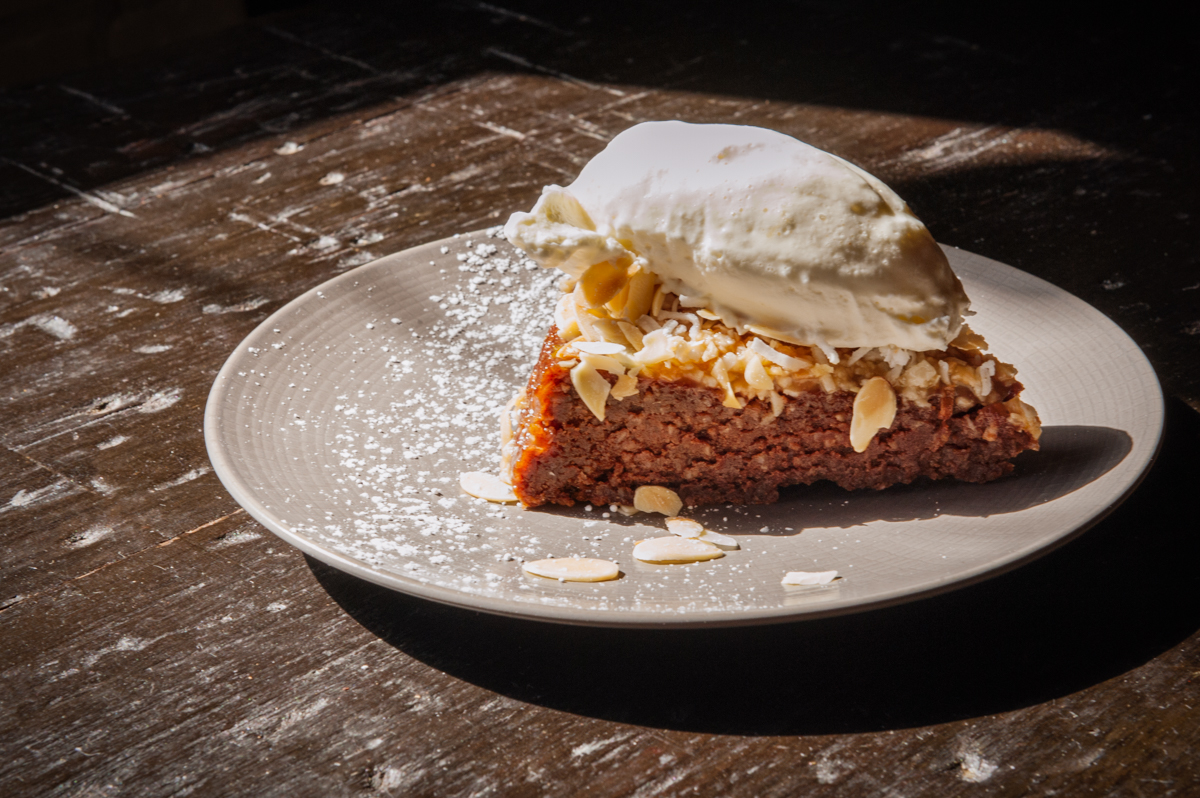
German chocolate cake. Photo by Chelsea Kyle
4. German Chocolate Cake
Perhaps no comestible better encapsulates Wiechmann’s collective respect for his family roots, his French tutelage, and his love of melting pot Americana, than Bronwyn’s signature dessert. Made with rich Valrhona chocolate, brown hazelnut flour, a crème anglaise, and that trademark smattering of shredded coconut, Weichmann’s interpretation is equal parts haute and homage. “Germany has a huge tradition of cake and pastry-making, which was always going to be one of the main focuses of the restaurant,” Wiechmann says. “The Germans make chocolate cake, but they never made it with coconut. It was the Pennsylvania Germans that added that aspect, but we wanted to keep that tradition alive.”
255 Washington St., Somerville; 617-776-9900 or bronwynrestaurant.com.

